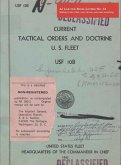In 1995, the end of the Cold War found the US Navy grappling with its role and its future. Dr. James Tritten ably articulated the value of naval doctrine in this historical survey for the Naval Doctrine Command. In subsequent decades, USN doctrine evolved in response to changing circumstances, in some instances successfully, in some instances not. The USN abandoned long-distance strike aircraft in a doctrinal pursuit of sorties-to-shore, wasted decades on a Littoral Combat Ship that was almost literally all doctrine, and saw its seakeeping readiness degrade at a level even more fundamental than the doctrinal. Today, the US Navy is faced with an existential threat from a peer competitor that can outrange it, outshoot it, and outbuild it. Getting naval doctrine right has never been more critical. Understanding its history is a necessary first step that will repay investment for anyone interested in American sea power: that is, American national power. From the author's abstract: Navy doctrine has existed in the past [it is not new]; It is proper to study the doctrinal lessons of other nations and other services; important doctrinal lessons can be drawn from history; Formal navy doctrine suffered a setback with the introduction of new technologies and the end of the Anglo-Franco wars in the Nineteenth Century; Pre-war military doctrine cannot forseee all eventualities; Centralized military doctrine should not be cast in stone; Military doctrine has changed due to a variety of circumstances; It is not easy to institute a significant doctrinal change in large organizations; it appears easier to change military doctrine when it is written; Measures of effectiveness are needed for military doctrine; Successful navy doctrine has been prepared by a variety of individuals; Doctrine must be meaningful; Joint and multinational doctrine become more important as national forces downsize; Multinational doctrine for navy forces will be inherently different than multinational doctrine for land forces; There is no one correct military doctrine; There is a doctrinal renaissance in progress; Good military doctrine is of no value without good men and women who are trained and provided the proper equipment; And naval doctrine is not risk free. This book is annotated by Nimble AI and includes a Foreword by ; a variety of pithy, opinionated abstracts including scientific style, tldr, tldr one word, Explain It to Me Like I'm Five Years Old, and Action Items; tools for viewpoint diversity such as Dissents, Red Team Critiques, and MAGA Perspectives; a recursive summary with synopsis; page-by-page summaries; and interior art by artist herb.loc['AI'].""








